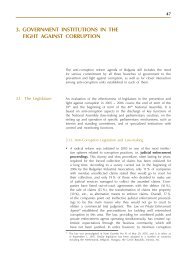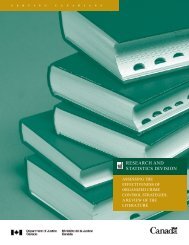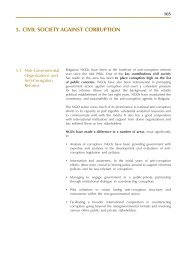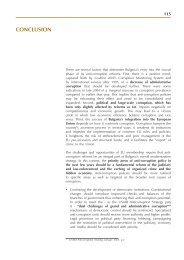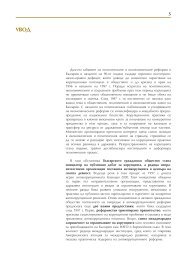- Page 1 and 2: IntegratIng refugee and asylum-seek
- Page 3 and 4: © This Handbook presents the resea
- Page 5 and 6: 4 Integrating refugee and asylum-se
- Page 7 and 8: 6 Integrating refugee and asylum-se
- Page 9 and 10: 8 Integrating refugee and asylum-se
- Page 11 and 12: 10 Integrating refugee and asylum-s
- Page 13 and 14: 12 Integrating refugee and asylum-s
- Page 15 and 16: 14 Integrating refugee and asylum-s
- Page 17 and 18: 16 Integrating refugee and asylum-s
- Page 19 and 20: 18 Integrating refugee and asylum-s
- Page 21 and 22: 20 Integrating refugee and asylum-s
- Page 23: 22 Integrating refugee and asylum-s
- Page 27 and 28: 26 Integrating refugee and asylum-s
- Page 29 and 30: 28 Integrating refugee and asylum-s
- Page 31 and 32: 30 Integrating refugee and asylum-s
- Page 34: chapter I. good practIces In the fI
- Page 37 and 38: 36 Integrating refugee and asylum-s
- Page 39 and 40: 38 Integrating refugee and asylum-s
- Page 41 and 42: 40 Integrating refugee and asylum-s
- Page 43 and 44: 42 Integrating refugee and asylum-s
- Page 45 and 46: 44 Integrating refugee and asylum-s
- Page 47 and 48: 46 Integrating refugee and asylum-s
- Page 49 and 50: 48 Integrating refugee and asylum-s
- Page 51 and 52: 50 Integrating refugee and asylum-s
- Page 53 and 54: 52 Integrating refugee and asylum-s
- Page 55 and 56: 54 Integrating refugee and asylum-s
- Page 57 and 58: 56 Integrating refugee and asylum-s
- Page 59 and 60: 58 Integrating refugee and asylum-s
- Page 61 and 62: 60 Integrating refugee and asylum-s
- Page 63 and 64: 62 Integrating refugee and asylum-s
- Page 65 and 66: 64 Integrating refugee and asylum-s
- Page 67 and 68: 66 Integrating refugee and asylum-s
- Page 69 and 70: 68 Integrating refugee and asylum-s
- Page 71 and 72: 70 Integrating refugee and asylum-s
- Page 73 and 74: 72 Integrating refugee and asylum-s
- Page 75 and 76:
74 Integrating refugee and asylum-s
- Page 78 and 79:
2. country reports 2.1. country rep
- Page 80 and 81:
country report: austria 79 Commissi
- Page 82 and 83:
country report: austria 81 Table 6.
- Page 84 and 85:
country report: austria 83 3. InstI
- Page 86 and 87:
country report: austria 85 first in
- Page 88 and 89:
country report: austria 87 asylum s
- Page 90 and 91:
country report: austria 89 seeking
- Page 92 and 93:
country report: austria 91 4.2. acc
- Page 94 and 95:
country report: austria 93 permits
- Page 96 and 97:
country report: austria 95 knowledg
- Page 98 and 99:
country report: austria 97 5.2. epI
- Page 100 and 101:
country report: austria 99 5.2.2. B
- Page 102 and 103:
country report: austria 101 activit
- Page 104 and 105:
country report: austria 103 • Cre
- Page 106 and 107:
country report: austria 105 • In
- Page 108 and 109:
country report: austria 107 UN Comm
- Page 110 and 111:
country report: Bulgaria 109 2. ref
- Page 112 and 113:
country report: Bulgaria 111 The de
- Page 114 and 115:
country report: Bulgaria 113 The re
- Page 116 and 117:
country report: Bulgaria 115 benefi
- Page 118 and 119:
country report: Bulgaria 117 of una
- Page 120 and 121:
country report: Bulgaria 119 It sho
- Page 122 and 123:
country report: Bulgaria 121 • Bu
- Page 124 and 125:
country report: Bulgaria 123 knowle
- Page 126 and 127:
country report: Bulgaria 125 Bulgar
- Page 128 and 129:
country report: Bulgaria 127 Once s
- Page 130 and 131:
country report: Bulgaria 129 they e
- Page 132 and 133:
country report: Bulgaria 131 conduc
- Page 134 and 135:
country report: Bulgaria 133 bIblIo
- Page 136 and 137:
country report: Bulgaria 135 lIst o
- Page 138 and 139:
country report: italy 137 to reach
- Page 140 and 141:
country report: italy 139 Table 16.
- Page 142 and 143:
country report: italy 141 proclaime
- Page 144 and 145:
country report: italy 143 establish
- Page 146 and 147:
country report: italy 145 The Scuol
- Page 148 and 149:
country report: italy 147 5. descrI
- Page 150 and 151:
country report: italy 149 musical,
- Page 152 and 153:
country report: italy 151 Pietro Ve
- Page 154 and 155:
country report: italy 153 6.2. Qual
- Page 156 and 157:
2.4. country report: slovenIa 1. me
- Page 158 and 159:
country report: slovenia 157 an ind
- Page 160 and 161:
country report: slovenia 159 (twent
- Page 162 and 163:
country report: slovenia 161 signif
- Page 164 and 165:
country report: slovenia 163 for a
- Page 166 and 167:
country report: slovenia 165 since
- Page 168 and 169:
country report: slovenia 167 How th
- Page 170 and 171:
country report: slovenia 169 • co
- Page 172 and 173:
country report: slovenia 171 the us
- Page 174 and 175:
country report: slovenia 173 the co
- Page 176 and 177:
country report: slovenia 175 incide
- Page 178 and 179:
country report: slovenia 177 append
- Page 180 and 181:
country report: slovenia 179 Table
- Page 182 and 183:
country report: slovenia 181 Table
- Page 184 and 185:
country report: sweden 183 2. refug
- Page 186 and 187:
country report: sweden 185 Table 29
- Page 188 and 189:
country report: sweden 187 Table 32
- Page 190 and 191:
country report: sweden 189 3.1.1. C
- Page 192 and 193:
country report: sweden 191 is stres
- Page 194 and 195:
country report: sweden 193 equal ac
- Page 196 and 197:
country report: sweden 195 Table 34
- Page 198 and 199:
country report: sweden 197 Table 35
- Page 200 and 201:
country report: sweden 199 educatio
- Page 202 and 203:
country report: sweden 201 this end
- Page 204 and 205:
country report: sweden 203 • asse
- Page 206 and 207:
country report: sweden 205 5.6. pro
- Page 208 and 209:
country report: sweden 207 particip
- Page 210 and 211:
country report: sweden 209 agenda i
- Page 212 and 213:
country report: sweden 211 their ar
- Page 214 and 215:
country report: sweden 213 SFS 2001
- Page 216 and 217:
2.6. country report: estonIa 1. met
- Page 218 and 219:
country report: estonia 217 them ha
- Page 220 and 221:
country report: estonia 219 3. Inst
- Page 222 and 223:
country report: estonia 221 3.3. no
- Page 224 and 225:
country report: estonia 223 subject
- Page 226 and 227:
country report: estonia 225 to addr
- Page 228 and 229:
country report: estonia 227 culture
- Page 230 and 231:
country report: estonia 229 skills
- Page 232 and 233:
country report: estonia 231 bIblIog
- Page 234 and 235:
2.7. country report: greece 1. meth
- Page 236 and 237:
country report: greece 235 rate of
- Page 238 and 239:
country report: greece 237 negative
- Page 240 and 241:
country report: greece 239 There ar
- Page 242 and 243:
country report: greece 241 In pract
- Page 244 and 245:
country report: greece 243 teachers
- Page 246 and 247:
country report: greece 245 6.2. dis
- Page 248 and 249:
country report: greece 247 bIblIogr
- Page 250 and 251:
country report: greece 249 Table 38
- Page 252 and 253:
country report: netherlands 251 Fou
- Page 254 and 255:
country report: netherlands 253 the
- Page 256 and 257:
country report: netherlands 255 fig
- Page 258 and 259:
country report: netherlands 257 fig
- Page 260 and 261:
country report: netherlands 259 cla
- Page 262 and 263:
country report: netherlands 261 sch
- Page 264 and 265:
country report: netherlands 263 spe
- Page 266 and 267:
country report: netherlands 265 gro
- Page 268 and 269:
country report: netherlands 267 fig
- Page 270 and 271:
country report: netherlands 269 rea
- Page 272 and 273:
country report: netherlands 271 for
- Page 274 and 275:
country report: netherlands 273 As
- Page 276 and 277:
country report: netherlands 275 the
- Page 278 and 279:
country report: netherlands 277 OEC
- Page 280 and 281:
2.9. country report: poland 1. Intr
- Page 282 and 283:
country report: poland 281 and limi
- Page 284 and 285:
country report: poland 283 Polish c
- Page 286 and 287:
country report: poland 285 applianc
- Page 288 and 289:
country report: poland 287 figure 2
- Page 290 and 291:
country report: poland 289 the foll
- Page 292 and 293:
country report: poland 291 • Soci
- Page 294 and 295:
country report: poland 293 and loca
- Page 296 and 297:
country report: poland 295 project
- Page 298 and 299:
country report: poland 297 It is an
- Page 300 and 301:
country report: poland 299 paid act
- Page 302 and 303:
country report: poland 301 Frelak,
- Page 304 and 305:
country report: poland 303 Table 44
- Page 306 and 307:
2.10. country report: unIted kIngdo
- Page 308 and 309:
country report: united kingdom 307
- Page 310 and 311:
country report: united kingdom 309
- Page 312 and 313:
country report: united kingdom 311
- Page 314 and 315:
country report: united kingdom 313
- Page 316 and 317:
country report: united kingdom 315
- Page 318 and 319:
country report: united kingdom 317
- Page 320 and 321:
country report: united kingdom 319
- Page 322 and 323:
country report: united kingdom 321
- Page 324 and 325:
country report: united kingdom 323
- Page 326 and 327:
country report: united kingdom 325
- Page 328 and 329:
country report: united kingdom 327
- Page 330:
country report: united kingdom 329
- Page 334 and 335:
1. comparatIve report: promotIng be
- Page 336 and 337:
comparative report: promoting Best
- Page 338 and 339:
comparative report: promoting Best
- Page 340 and 341:
comparative report: promoting Best
- Page 342 and 343:
comparative report: promoting Best
- Page 344 and 345:
comparative report: promoting Best
- Page 346:
comparative report: promoting Best
- Page 349 and 350:
348 Integrating refugee and asylum-
- Page 351 and 352:
350 Integrating refugee and asylum-
- Page 353 and 354:
352 Integrating refugee and asylum-
- Page 355 and 356:
354 Integrating refugee and asylum-
- Page 357 and 358:
356 Integrating refugee and asylum-
- Page 359 and 360:
358 Integrating refugee and asylum-
- Page 361 and 362:
360 Integrating refugee and asylum-
- Page 363 and 364:
362 Integrating refugee and asylum-
- Page 365 and 366:
364 Integrating refugee and asylum-
- Page 367 and 368:
366 Integrating refugee and asylum-
- Page 369 and 370:
368 Integrating refugee and asylum-
- Page 371 and 372:
370 Integrating refugee and asylum-
- Page 373 and 374:
372 Integrating refugee and asylum-
- Page 375 and 376:
374 Integrating refugee and asylum-
- Page 377 and 378:
376 Integrating refugee and asylum-
- Page 379 and 380:
378 Integrating refugee and asylum-
- Page 381 and 382:
380 Integrating refugee and asylum-
- Page 383 and 384:
382 Integrating refugee and asylum-
- Page 385 and 386:
384 Integrating refugee and asylum-
- Page 388 and 389:
polIcy recommendatIons This section
- Page 390 and 391:
policy recommendations 389 2. polIc
- Page 392 and 393:
policy recommendations 391 their ed
- Page 394:
policy recommendations 393 followin
- Page 397 and 398:
396 Integrating refugee and asylum-
- Page 399 and 400:
398 Integrating refugee and asylum-
- Page 401 and 402:
400 Integrating refugee and asylum-
- Page 403 and 404:
402 Integrating refugee and asylum-
- Page 405 and 406:
404 Integrating refugee and asylum-
- Page 407 and 408:
406 Integrating refugee and asylum-
- Page 409 and 410:
408 Integrating refugee and asylum-
- Page 411 and 412:
410 Integrating refugee and asylum-
- Page 413 and 414:
412 Integrating refugee and asylum-
- Page 415 and 416:
414 Integrating refugee and asylum-
- Page 417 and 418:
416 Integrating refugee and asylum-
- Page 419 and 420:
418 Integrating refugee and asylum-
- Page 421 and 422:
420 Integrating refugee and asylum-
- Page 423 and 424:
422 Integrating refugee and asylum-
- Page 425 and 426:
424 Integrating refugee and asylum-
- Page 428 and 429:
publIcatIons by the center for the
- Page 430:
partners in crime: the risks of sym




